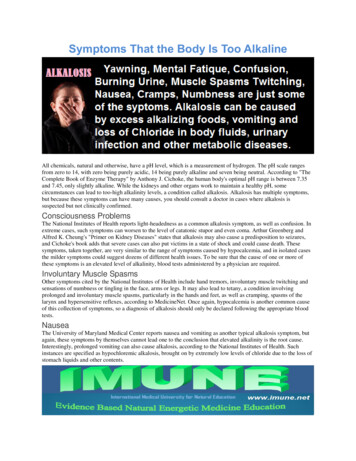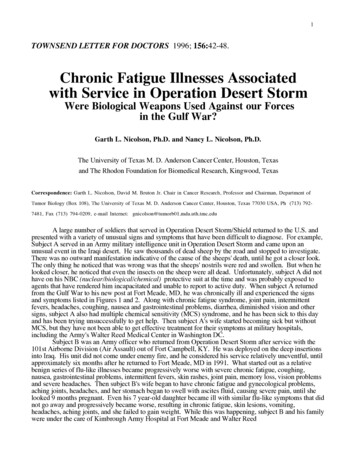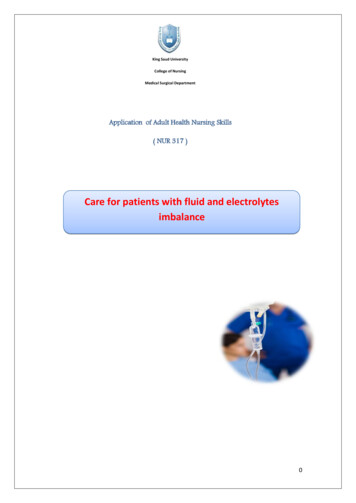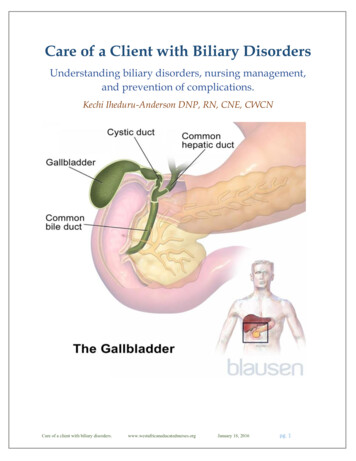
Transcription
Symptoms That the Body Is Too AlkalineAll chemicals, natural and otherwise, have a pH level, which is a measurement of hydrogen. The pH scale rangesfrom zero to 14, with zero being purely acidic, 14 being purely alkaline and seven being neutral. According to "TheComplete Book of Enzyme Therapy" by Anthony J. Cichoke, the human body's optimal pH range is between 7.35and 7.45, only slightly alkaline. While the kidneys and other organs work to maintain a healthy pH, somecircumstances can lead to too-high alkalinity levels, a condition called alkalosis. Alkalosis has multiple symptoms,but because these symptoms can have many causes, you should consult a doctor in cases where alkalosis issuspected but not clinically confirmed.Consciousness ProblemsThe National Institutes of Health reports light-headedness as a common alkalosis symptom, as well as confusion. Inextreme cases, such symptoms can worsen to the level of catatonic stupor and even coma. Arthur Greenberg andAlfred K. Cheung's "Primer on Kidney Diseases" states that alkalosis may also cause a predisposition to seizures,and Cichoke's book adds that severe cases can also put victims in a state of shock and could cause death. Thesesymptoms, taken together, are very similar to the range of symptoms caused by hypocalcemia, and in isolated casesthe milder symptoms could suggest dozens of different health issues. To be sure that the cause of one or more ofthese symptoms is an elevated level of alkalinity, blood tests administered by a physician are required.Involuntary Muscle SpasmsOther symptoms cited by the National Institutes of Health include hand tremors, involuntary muscle twitching andsensations of numbness or tingling in the face, arms or legs. It may also lead to tetany, a condition involvingprolonged and involuntary muscle spasms, particularly in the hands and feet, as well as cramping, spasms of thelarynx and hypersensitive reflexes, according to MedicineNet. Once again, hypocalcemia is another common causeof this collection of symptoms, so a diagnosis of alkalosis should only be declared following the appropriate bloodtests.NauseaThe University of Maryland Medical Center reports nausea and vomiting as another typical alkalosis symptom, butagain, these symptoms by themselves cannot lead one to the conclusion that elevated alkalinity is the root cause.Interestingly, prolonged vomiting can also cause alkalosis, according to the National Institutes of Health. Suchinstances are specified as hypochloremic alkalosis, brought on by extremely low levels of chloride due to the loss ofstomach liquids and other contents.
Becoming Too AlkalineThe pH of the urine can be alkaline in response to the body being too acidic and this is when wehear people say that they are too alkaline and therefore they do not need to be on an alkalinediet. The opposite is true, this is the body adapting to being bombarded with a diet of highprotein acidic foods which has finally run out of organic sodium required to neutralize thesestrong acids. In a last ditch effort to protect the cells and tissue the kidneys produce a greatersupply of the hormone glutaminase that causes ammonia to be released from the amino acidglutamine. Ammonia is very alkaline and in this situation the pH of the urine will be high. This isthe emergency backup system to make up for the insufficient sodium reserve for neutralizingthe strong acids from the high protein diet. This is a signal to get on an alkaline diet withvegetables high in sodium because you are too acid.The odor of ammonia is usual in the rooms of patients who are in the final stages of cancer. Thebaby diaper that smells of ammonia is the body adapting to a diet of excess nitrogen.The body is a wonderful machine with backup systems to respond perfectly to each situation.When we call on these backup systems over and over again with our lifestyle of excess proteinand other acidic food intake, then these systems finally break down.
Being too alkaline is a sign that this breakdown is already underwayAll ingested substances and all situations (physical, emotional, or mental) that affect the body,leave either an alkaline or acid ash residue in the urine.” Sulfur, iodine, chloride, phosphorous,bromine, copper, silicon and fluoride are acid-forming minerals because they have a negativecharge. The body uses various minerals, many of which leave behind acid ash when they areused up. For instance, each heartbeat occurs due to magnesium firing. Nerves must fire inprecisely the correct sequence to stimulate muscles that contract the chambers of the heart. Asthe magnesium is used, the acid ash from the reaction must be removed. The body removesash efficiently when it is healthy, alkaline and its various systems are balanced. When mineralash is not removed from the body, it accumulates and acidifies it.Becoming Too Alkaline “The best and safest thing is to keep a balance in your life, acknowledgethe great powers around us and in us. If you can do that, and live that way, you are really a wiseman.” EuripidesIt is difficult for the body to become over-alkalized, a condition known as alkalosis, which isextremely rare and is caused by unnatural imbalances in the body as a result of poor diet.Nearly everything the average person consumes, including cooked and processed foods,acidifies the body tremendously. Nearly all recreational beverages are acidic, including coffee,black tea, commercial juices, milk, soft drinks and alcohol. Stress adds tremendous amounts ofacidity to the body, as does pollution. Industrialization has toxified and acidified ourenvironment since its inception. Toxins have concentrated at the north and south polesbecause of air currents and prevailing weather patterns. Given the amount of acid that is addedto the average person on a daily basis, it would be extremely difficult for anyone to overalkalizetheir body. I have consumed 1.5—2.0 gallons of Ionized Water everyday for 10 years at apH 9.5 or higher. I live on a 99% raw food diet, which is alkalizing, and my body pH is alwaysbalanced at close to 7.0. I have never measured my body pH and found it to be too alkaline.Over-alkalizing your body will not occur if your approach to health is completely natural. Naturealways puts the body into balance when its laws are followed and at the core of homeostasis isa neutral pH. If we wish to determine a person’s overall health, the first determination thatshould be made is their body pH. Drinking Ionized Water with a high pH of 9.0—9.9 cansometimes induce a feeling of nausea in the stomach, especially when consumed first thing inthe morning. This is not harmful nor is it an indication that you are consuming Ionized Water attoo high a pH level. If the stomach remains acid with a pH of 5.0 or lower, the suddenintroduction of an extremely alkaline substance such as Ionized Water can cause a gag reflex inthe body. This is a natural reaction because the body views any radical change in pH assomething potentially dangerous or poisonous to it, thus its instinct is rid the body of it. Relax,breathe slowly and deeply and the feeling of nausea will likely subside in a short period of timeMeasuring Body pH Body pH is measured through the saliva or urine. Many things can causethe pH of urine or saliva to quickly rise or fall. For instance, consuming extremely alkalinesubstances such as asparagus or Ionized Water can turn the urine acidic because theyeffectively remove acid waste from the body. With persistence, however, consuming alkaline
substances will turn body’s overall pH more alkaline. Saliva is an accurate measurement of pHas long as you haven’t drank or eaten anything for 45 minutes before measuring it. Litmus pHpaper is the most accurate measurement of saliva’s pH. Color pH test drops (phenol red) are alittle more accurate than litmus paper, but both rely on matching color with the eye, which canbe somewhat subjective. It’s difficult to determine the exact pH of any liquid within a singlelogarithmic point, meaning the difference between 9 and 10, let alone a tenth of a point.
How to Tell If Your Body Is Acidic or AlkalineLast Updated: Aug 16, 2013 By Brian RichardsHow to Tell If Your Body Is Acidic or Alkaline Photo Credit Jupiter images/Comstock/Getty ImagesYour body's acidity or alkalinity may be a symptom of an underlying illness. You can find out if your bodyis acidic or alkaline by measuring its pH. The pH scale ranges from 0, which is very acidic, to 14, which isvery basic. Pure water has a pH of 7, which is completely neutral. A healthy pH is neutral or slightlyalkaline at approximately 7.0 to 7.2. Testing the pH of your urine will reveal the presence of any unusualacidity or alkalinity, which may indicate that your kidneys are working hard to neutralize your blood.Step 1Wait until you have urinated once or twice before capturing your urine for testing. Morning urine typically containsmore particulates, as it has been collecting in your bladder for a longer period of time.Step 2Capture the middle of your urine flow in your plastic cup for testing. Both the beginning and end of a urine streamwill contain different levels of particulates, so capturing the middle of your flow is important in collecting anaccurate sample.Step 3Tear off a one inch strip from your roll of litmus paper. Submerge one end of the litmus paper in the urine, and holdit for approximately five seconds.Obesity And Weight Management Programs. Become a Provider Today!disciplined-eating.comStep 4Remove the litmus paper from your urine and compare its color to the chart printed on the roll of litmus paper. Thecolor may vary between yellow and dark blue, indicating a pH between 4.5 and 9.0. Ideally, the litmus paper willturn bluish green, which indicates a pH around 7.0 to 7.2.Step 5Test two more times during the day, ideally once in the morning, once in the afternoon and once in the evening.Average your results for the most accurate pH reading, as the body's pH fluctuates throughout the day.
WarningsOnly a doctor can properly analyze your urinary pH to make a proper diagnosis. Do not make dietary alterations ormedical determinations based on your urinary pH without input from a physician.TipsAccording to the U.S. National Library of Medicine, "Acidic urine is associated with xanthine, cystine, uric acid andcalcium oxalate stones. Alkaline urine is associated with calcium carbonate, calcium phosphate and magnesiumphosphate stones."
the strong acids from the high protein diet. This is a signal to get on an alkaline diet with vegetables high in sodium because you are too acid. The odor of ammonia is usual in the rooms of patients who are in the final stages of cancer. The baby diaper that smells of ammonia is the bod











